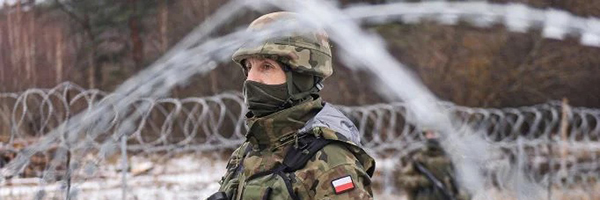Poland Destroys Economy to Strengthen NATO’s Eastern Border with Russia
The statement by Poland that it needs to rearm its troops in preparation for a “war with Russia” in the next few years is intended to attract additional aid and weapons from NATO to strengthen its eastern borders and to modernise its arsenal after it supplied obsolete weapons to Ukraine. However, this comes at the price of destroying the economy and the quality of life of the average citizen.
Poland’s Deputy Defence Minister Marcin Ociepa said that Warsaw sees “the danger of war with Russia” in next three to ten years and needs to use this time to rearm, “no matter the cost”.
With war waging in Ukraine, Poland wants to show that it is on the front lines in the fight against a supposedly “aggressive Russia” and position itself as a major player in Europe and NATO. Poland in this light is stressing that the EU and NATO need to strengthen its eastern borders.
The Poles freed up their stockpile of obsolete weapons by sending them to Ukraine and now expects new weapons and preferential treatment from Western countries, primarily the United States. The Poles are wanting air defence systems, missile defence systems, potentially new ground forces, and heavy equipment, such as tanks and self-propelled artillery.
This also comes as Poland and the three Baltic states said on September 8 that they would temporarily restrict access for Russian citizens holding EU visas from entering by September 19. Supposedly, this is to address “public policy and security threats.”
The prime ministers of Estonia, Latvia, Lithuania and Poland said in a statement they were concerned “about the substantial and growing influx of Russian citizens” into the EU, adding: “We believe that this is becoming a serious threat to our public security and to the overall shared Schengen area.”
The statement said they “agreed on a common regional approach and hereby express their political will and firm intention to introduce national temporary measures for Russian citizens holding visas”, with exceptions only made for “dissidents,” “humanitarian cases,” and family members and holders of residence permits in EU countries.
It is recalled that EU foreign ministers met in Prague last month and agreed to suspend a 2007 visa facilitation deal with Russia, stopping short of a wider visa ban. However, EU foreign policy chief Josep Borrell said that countries bordering Russia could “take measures at a national level to restrict entry into the European Union.”
Effectively, in a cowardly way, Borrell allowed the Baltic states and Poland to put roadblocks on Russians from entering the EU. He emphasised that any measures would have to conform with rules for the EU’s Schengen common travel zone and members of Russian civil society should be able to travel to the EU. But clearly this is not the case.
With Poland closing its borders to Russian citizens and demanding the strengthening of its military, it is evident that Warsaw is preparing for an escalation in its relations with Moscow, something that will be enthusiastically backed by the US.
Poland is not an exception to the energy crisis gripping Europe, which is bringing great fears of recession once the winter arrives. US-led sanctions were imposed following the Russian military operation in Ukraine, forcing Moscow to insist that all purchases of energy must be made in the rouble, a demand that Warsaw has rejected. With Moscow’s decision to slash oil and natural gas exports, energy prices in Europe have gone through the roof and sent the cost-of-living soaring.
To deal with this, Poland has turned to Nigeria, already one of its gas suppliers, to increase its LNG shipments. This prompted Poland’s President Andrzej Duda to become the first leader from the Eastern European country to ever visit Nigeria since diplomatic relations were established 60 years ago. However, many remain sceptical that Nigeria, whose economy is badly battered, can meet the European and Polish demand, especially as unprecedented crude oil thefts by militants in the Niger Delta are affecting exports.
More importantly, Poland’s economy is slowing down. A GDP drop to 2.7% is expected in Q3 2022, the Polish Economic Institute (PIE) reported on August 31. This followed from a drop of 8.5 to 5.3% in Q2. The state-owned think tank believes that inflation by the end of Q4 will be at 14.5% but could rise to 15.6% in February 2023 due to rising energy prices.
In this way, Poland is prioritising US interests in pressuring Moscow in the false belief that Russia is preparing to invade the country. This not only highlights that Poland still does not fully understand the reasons for Russia’s military operation in Ukraine, but that it is also willing to destroy the economy and quality of life of the average citizen for the sake of having new weapons and strengthening its military.
*
Ahmed Adel is a Cairo-based geopolitics and political economy researcher.

 Ahmed Adel, Global Research, September 10, 2022 — Warsaw escalates tensions with Moscow by banning entry of Russian citizens.
Ahmed Adel, Global Research, September 10, 2022 — Warsaw escalates tensions with Moscow by banning entry of Russian citizens.